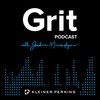

Grit
Kleiner Perkins
Grit explores what it takes to create, build, and scale world-class organizations. It features weekly episodes highlighting the leaders who are pushing their companies to make a difference. This series is hosted by Joubin Mirzadegan, go to market operating partner at Kleiner Perkins, a venture capital firm investing in history-making founders.
Episodes
Mentioned books
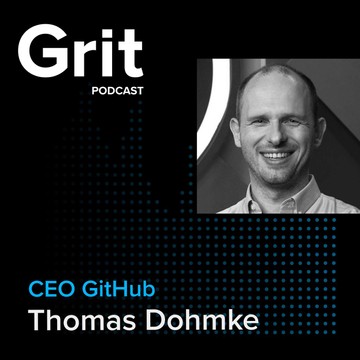
Jan 30, 2023 • 1h 11min
#123 CEO GitHub, Thomas Dohmke: Open-Source Values
In the middle of the Great Recession, Thomas Dohmke quit a stable job at a good company because “I wanted to build stuff again.” Specifically, he was inspired by the release of the first software development kit for iOS, and wanted to be part of the mobile revolution. Two companies later and halfway around the world, he is the CEO of software development powerhouse Github and on the precipice of another revolution — that of AI tools such as Github Copilot. Up to 40 percent of Copilot users’ code is already being autocompleted by AI, and Thomas predicts that number could get to 80 percent in the next five years. “We are heading into a world where developers are much more architecture and system designers,” he says.In this episode, Thomas and Joubin discuss staying excited, A/B tests for life, triggering emails, “the toys you can’t have,” self-driving car sensors, the first iPhone SDK, app testing, US work visas, life-changing money, Xamarin, is Github a social network?, being ultra-transparent, ghost text, ChatGPT and Midjourney, generating passion, rehearsing forever, Mittelstand companies, and the zen of LEGO.In this episode, we cover:Titles at Microsoft and working with CEO Satya Nadella (00:58)Being “85% happy” and the temptation to leave big companies for a startup (05:33)How Thomas went from early user to CEO of GitHub (09:22)Growing up in East Germany and the fall of the Berlin Wall (13:19)Why Thomas quit his job at the height of the financial crisis: “I wanna build stuff again” (22:28)Being acquired by Microsoft and coming to America (27:26)The startup mindset and “open-source” values (34:09)How Github’s “AI programmer,” Copilot, will change everything for developers (40:32)When will generative AI have its “iPhone moment?” (45:44)Exponential change and preparing your kids for the unknown future (50:57)Communicating in English, and whether Thomas’ family would ever go back to Germany (57:21)Tech culture in Europe vs. Silicon Valley and the pressure of “more” (01:01:19) The “LEGO room” in Thomas’ house (01:07:18)Links:Connect with ThomasTwitterLinkedInConnect with JoubinTwitterLinkedInEmail: grit@kleinerperkins.com Learn more about Kleiner PerkinsThis episode was edited by Eric Johnson from LightningPod.fm
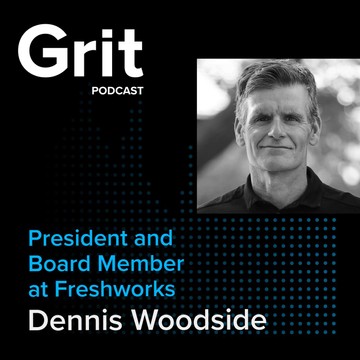
Jan 23, 2023 • 1h 5min
#122 President & Board Member at Freshworks, Dennis Woodside: What If This Goes Really Well?
Freshworks president Dennis Woodside copes with stress by running as often as he can, a habit that began when he was CEO of Motorola Mobility. So far, he has run “16 to 17” Ironman triathlons. He’s also continually challenging himself in his professional life, leaving Motorola in 2014 to advise the founder-CEOs: Dropbox’s Drew Houston, Impossible Foods’ Pat Brown, and now Freshworks’ Girish Mathrubootham. Dennis’ advice for anyone working with founders is to “have empathy” for what they’re going through, and to understand what motivates them. Without that understanding, he says, you won’t be able to arrive at a shared vision for the company.In this episode, Dennis and Joubin discuss mega-acquisitions, the smartphone paradigm shift, triathlons and competitiveness, winning every category, “softening up,” global cities, Google interview questions, spreading Silicon Valley culture, the “chrome panda moment,” hiring the right people, “Where do you want to be in five years?”, evaluating new opportunities, and building trust with founders.In this episode, we cover:Google’s acquisition of Motorola and how Dennis went from ad exec to first-time CEO (02:00)Did Dennis like being the CEO of Motorola? (08:04)The stress of the new job and dealing with it through exercise (13:02)Dennis’ impressive résumé and what dinner conversation was like growing up (18:37)Going to Korea and choosing the harder path (23:00)Joining Google in 2003 as a general problem-solver (26:23)Hiring “scouts” all around the world to better understand the internet (30:41)Leaving Motorola to mentor Dropbox CEO Drew Houston (39:12)Checking your ego and the listening tour that wasn’t (42:20)Dropbox’s IPO and why the stock has been relatively flat (48:38)Changing jobs without breaks, and spotting new opportunities like Freshworks (52:19)Tips for working with founders and interrogating the status quo (58:02)Dennis’ most unique OKR at Dropbox (01:02:39)Links:Connect with DennisLinkedInConnect with JoubinTwitterLinkedInEmail: grit@kleinerperkins.com Learn more about Kleiner PerkinsThis episode was edited by Eric Johnson from LightningPod.fm
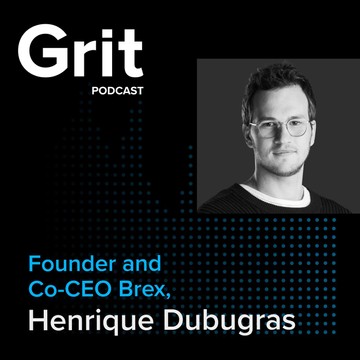
4 snips
Jan 16, 2023 • 55min
#121 Founder & Co-CEO Brex, Henrique Dubugras: Pivot or Else
The best advice Brex founder and co-CEO Henrique Dubugras ever received came from Snap CEO Evan Spiegel: The best CEOs, Spiegel told him, are “extremely authentic to themselves ... If you try to emulate being Elon Musk and you’re not like that, you’re just gonna fail.” This wisdom has empowered Dubugras and his co-founder, Pedro Franceschi, to focus on the places where they can be most effective at Brex, and to be more authentic with their coworkers. In this episode, Henrique and Joubin discuss coaches vs. therapy, mutual crushes, “hacker famous,” big egos, why missions are overrated, dropping out of college, CEO’s identities, the “Silicon Valley mold,” trojan-horsing Max Levchin, pivoting after two years, going to the ground, compensation and hiring myths, core customers, fixing expense report policies, and joining the Expedia board.In this episode, we cover:Growing up in Brazil and Henrique’s relationship with his mom (01:07)The first company he sold, Pagar.me, and his co-founder Pedro Franceschi (07:11)Becoming “successful” and why it’s fine to have a “f**ked up motivation” (10:35)ADHD, dueling superpowers, and focusing on the right things (15:56)Being an authentic CEO and not reading books (19:51)The radical changes Brex has experienced in the past three years (24:40)Brex’s new spend management product and landing initial customers (30:30)The messages sent by how Brex structures its employee compensation (34:07)How Henrique and Pedro recruited top talent when they were just getting started (38:57)Pivoting a $12 billion company: “We can’t do all these things” (43:33)The challenges of becoming more of an enterprise company than a Fintech one (50:34)Links:Connect with HenriqueTwitterLinkedInConnect with JoubinTwitterLinkedInEmail: grit@kleinerperkins.com Learn more about Kleiner PerkinsThis episode was edited by Eric Johnson from LightningPod.fm
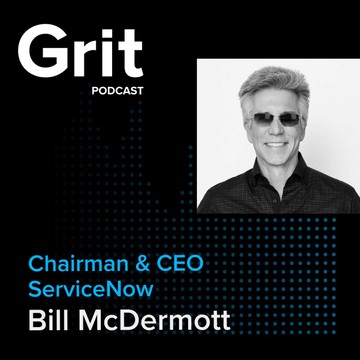
Jan 9, 2023 • 1h 4min
#120 Chairman & CEO ServiceNow, Bill McDermott: Full Speed Ahead
ServiceNow CEO Bill McDermott shares stories of resilience, optimism, and personal growth. From running a deli to leading SAP and ServiceNow, he discusses family, challenges, and making a positive impact. Reflecting on career transitions, personal adversity, and the importance of 'grit' in achieving success.
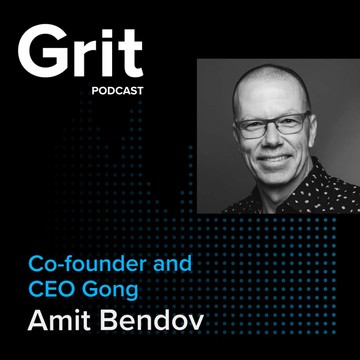
Jan 2, 2023 • 1h 2min
#119 Co-founder & CEO Gong, Amit Bendov: No Royalty
With more than 1,200 employees, it isn’t easy for Gong co-founder and CEO Amit Bendov to stay in touch with everyone. So, his team has established a series of regular programs to communicate the company’s priorities and give workers a chance to ask questions. And despite the revenue intelligence company’s scale, they’ve established a core value called No Royalty: “You’re supposed to be able to communicate with anybody in the company,” Amit says. “You’re no better than anybody.”In this episode, Amit and Joubin discuss name pronunciation, education and culture, communicating in English, family as pseudo-co-founders, remote work, AI customer management, missing the quarter, “Google for enterprise,” drinking your Kool-Aid, “win as a team,” GPTChat and other AI breakthroughs, and solving problems vs. pursuing opportunities.In this episode, we cover:The “captain’s table” and spreading company priorities (02:12)Amit’s first jobs and splitting his time between the US and Israel (06:47)The differences in work culture between the two countries, and returning to the office (14:19)Amit’s pre-gong jobs at Click Software, Panaya, and Sisense, and how he got the idea for Gong (18:40)Starting a new company in your 50s and why “nobody wanted to invest in us” (24:58)Gong’s brand, its culture, and the lines before personal and professional (32:15)The art of company-building and enjoying the ride (34:59)Professional struggles and two embarrassing stories about cars (39:57)Being on autopilot, and the pros & cons of letting your mind wander (45:05)Automation vs. personal human relationships, and what AI can do that humans can’t (48:04)If Amit were starting Gong over from scratch, what would he do differently? (55:08)Links:Connect with AmitTwitterLinkedinConnect with JoubinTwitterLinkedInEmail: grit@kleinerperkins.com Learn more about Kleiner PerkinsThis episode was edited by Eric Johnson from LightningPod.fm
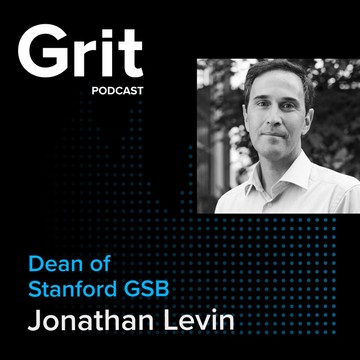
Dec 26, 2022 • 54min
#118 Dean of Stanford GSB, Jonathan Levin: Innovation Engines
Jon Levin has been teaching at Stanford for more than 20 years, and has been the dean of the famous Graduate School of Business since 2016. Although teaching at Stanford puts him in contact with some of the most promising future entrepreneurs in tech, he says he hasn’t yet been tempted to leave academia for a startup because “I actually love being part of an institution that’s gonna be around for hundreds of years.” As public trust in institutions has eroded in recent years, Jon and his colleagues have had to make changes. For example: Proactively challenging GSB students to think about “What does it mean to be a leader of an organization in today’s world?”In this episode, Jon and Joubin discuss honorific names, applying research in the real world, matching med school students, the “endless frontier,” the globalization of innovation, the entrepreneurial “itch,” the erosion of trust in institutions, US-China relations, students from Ukraine and Russia, what the GSB admissions staff looks for, self-awareness, the “Touchy Feely” class, and the serendipity of in-person classes. In this episode, we cover:The John Bates Clark Medal, and researching economic topics like auction design (01:56)Nobel Prize winners at the Stanford GSB and the uniqueness of the US university system (10:15)Teaching entrepreneurial students and the value of institutions (16:30)Being affirmative vs. reactive and how Jon measures success (23:07)International MBA students and the importance of geographic diversity (27:27)Growing up in an academic family and how Jon’s theory of teaching (34:47)The qualities that “great” GSB alumni have in common, and the gradual changes to business school cohorts (39:12) The qualities of “great” faculty and what was lost when classes moved to Zoom during COVID (47:06)Links:Connect with JonLinkedInConnect with JoubinTwitterLinkedInEmail: grit@kleinerperkins.com Learn more about Kleiner PerkinsThis episode was edited by Eric Johnson from LightningPod.fm
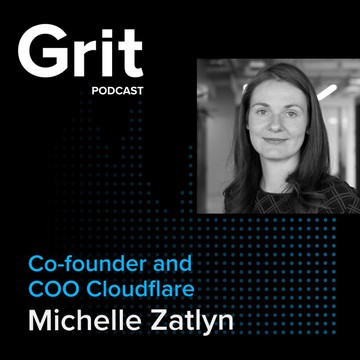
Dec 19, 2022 • 1h 17min
#117 Co-founder & COO Cloudflare, Michelle Zatlyn: A Better Internet
“Think about the pandemic without the internet,” says Cloudflare co-founder and COO Michelle Zatlyn. The world’s sudden shift to doing almost everything online only worked because network engineers, IT administrators, and internet infrastructure companies like Cloudflare had done the work. Michelle says that, both personally and professionally, she’s fine being under the radar because she doesn’t need to be publicly reminded of the importance of her job: “It's like all the roads, the tunnels, the bridges ... when it works, it's magic. Really, you don't even know we exist.”In this episode, Michelle and Joubin discuss the pressure of success, advice for founders, low-drama startups, the power of the Cloudflare blog, internet security, the cross-country U-Haul trip, sweating the details, San Francisco as a “power center,” helping the next generation of founders, “the airplane effect,” injecting tension, why learning is a superpower, and choosing to feel the bumps in the road.In this episode, we cover:Carrying the torch for women in infrastructure and “just getting started” (01:15)Being under the radar and the over-glamorization of founders (07:19)Why it’s so hard to hire & empower a great team (15:35)How Cloudflare is building a better internet (22:08)How Michelle, Matthew Prince, and Lee Holloway met and why they started Cloudflare (28:23)“Losing” at TechCrunch Disrupt’s Startup Battlefield — and turning it into a win (34:10)Building remote vs. choosing to be in the SF Bay Area (40:54)“I don’t understand why anyone starts companies” (46:28)How to run the best board meeting ever (55:31)Why Michelle brought her kids to the New York Stock Exchange for “Mom’s Special Day” (01:00:51)The skill that sets good founders apart from great ones (01:02:34)How a back injury took away a year of Michelle’s life (01:10:16)Links:Connect with MichelleTwitterLinkedInConnect with JoubinTwitterLinkedInEmail: grit@kleinerperkins.com Learn more about Kleiner PerkinsThis episode was edited by Eric Johnson from LightningPod.fm
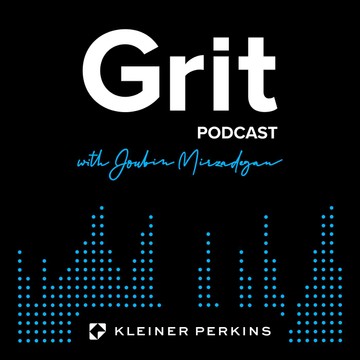
Dec 12, 2022 • 1h 5min
#116 Grit Recap: 9 Intersections of Personal and Professional
Guests Ozge Ozcan and Sarah Patterson share insights on burning out, the 'dark side' of grit, and the value of vulnerability in personal and professional life. The podcast explores navigating tough personal challenges, managing anxiety, fostering empathy, and balancing work with self-care for well-being and success.
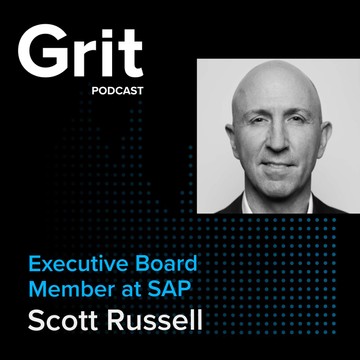
Dec 5, 2022 • 1h 2min
#115 Executive Board Member at SAP, Scott Russell: Chief Optimist Officer
SAP Executive Board Member Scott Russell used to avoid talking about his personal life with coworkers. But “we want to understand and relate to each other,” he says, and being more open has made people more willing to trust and follow him. “Authenticity, you cannot manufacture that,” Scott says. “When you’re only showing a part of who you are to your team, you’re not showing your true, authentic self.” In this episode, Scott and Joubin discuss European business structures, three-year contracts, creating a positive impact, informed feedback loops, maintaining a good emotional quotient, too much optimism, tough phone calls, playing the movie forward, helping your community, life balance, implicit trust and authenticity, finding new opportunities, considering other points of view, and speedboats vs. load-bearers.In this episode, we cover:Living around the world and away from HQ (01:05)Signing a three-year contract with yourself (08:09)The responsibility of delivering $1 billion in revenue every week (11:55)Getting to the truth when you’re near the top of a huge organization (14:07)The unintended consequences of optimism (17:11)Missing earnings and “what’s the worst thing that could happen?” (20:11)Scott’s childhood in Australia and his lifelong passion for basketball (26:21)Why the “work version” of Scott isn’t the best version (30:15)Being authentic with coworkers and how to drive outcomes in your personal life (33:53)The one place Scott’s family hasn’t been able to relocate happily (38:47)Loyalty to your work and your family (42:42)How competition drives better performance and keeps you honest (47:45)Finding discipline in your schedule and forcing yourself to relax (54:46)Where SAP is hiring, and Scott’s view of potential M&A or strategic partnerships (57:08)Links:Connect with ScottTwitterLinkedInConnect with JoubinTwitterLinkedInEmail: grit@kleinerperkins.com Learn more about Kleiner PerkinsThis episode was edited by Eric Johnson from LightningPod.fm
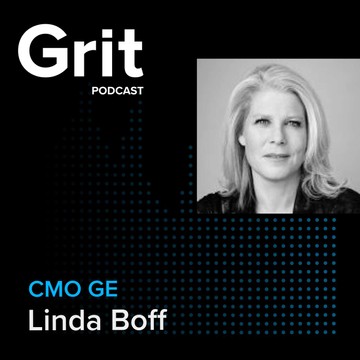
4 snips
Nov 28, 2022 • 47min
#114 CMO GE, Linda Boff: Play ‘Til the Whistle
In Silicon Valley when business is good, it's normal for top talent to hop from company to company to company. But GE's Linda Boff, described by at least one of her peers as the "Beyoncé of CMOs," has stayed at the 130-year-old conglomerate for nearly 20 years, through radical changes to the business structure, and with plans to split into three public companies on the horizon. She attributes her longevity to the fact that four out of five days of any week, she's excited to come in: "I believe in this company," Linda says. "I would have the hardest time if that went away, and it never has."In this episode, Linda and Joubin discuss helping young people succeed, finding your passion, the 1980 Winter Olympics, Thomas Edison, Twitter advertising, sticktoitiveness, being excited for work, being impatient, trying to please everybody, and calendar time management.In this episode, we cover:How a chance encounter with Video Monitoring Systems founder Robert Cohen changed Linda's life (03:17) Where Linda's work ethic came from, and her serial internships (06:21)Elon Musk and brand safety on Twitter (12:47) Why Linda has worked at GE for almost 20 years, and how it became an "industrial powerhouse" (15:22) Choosing to stay and giving a shit (21:40) How much should you love your job? (25:57) If she were starting over, what would Linda do differently? (32:09) Getting the truth & what other people think (34:38) Linda's calendar and writing thank-you notes to coworkers (38:55)Links:Connect with LindaTwitterLinkedInConnect with JoubinTwitterLinkedInEmail: grit@kleinerperkins.com Learn more about Kleiner PerkinsThis episode was edited by Eric Johnson from LightningPod.fm


